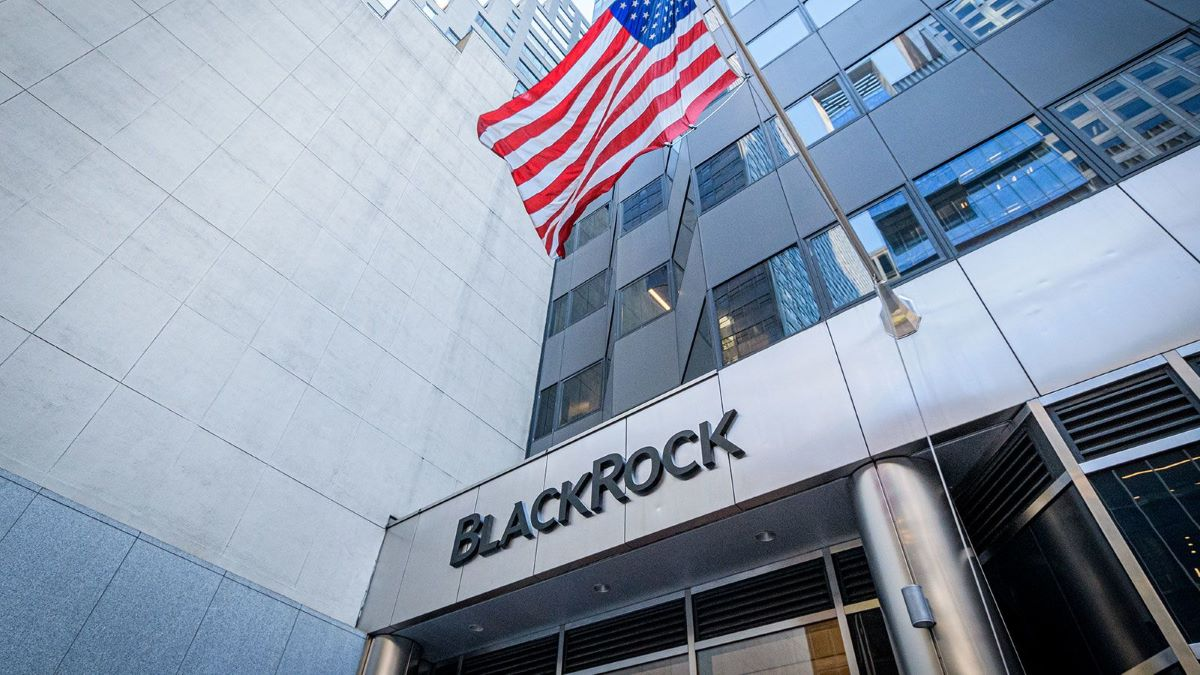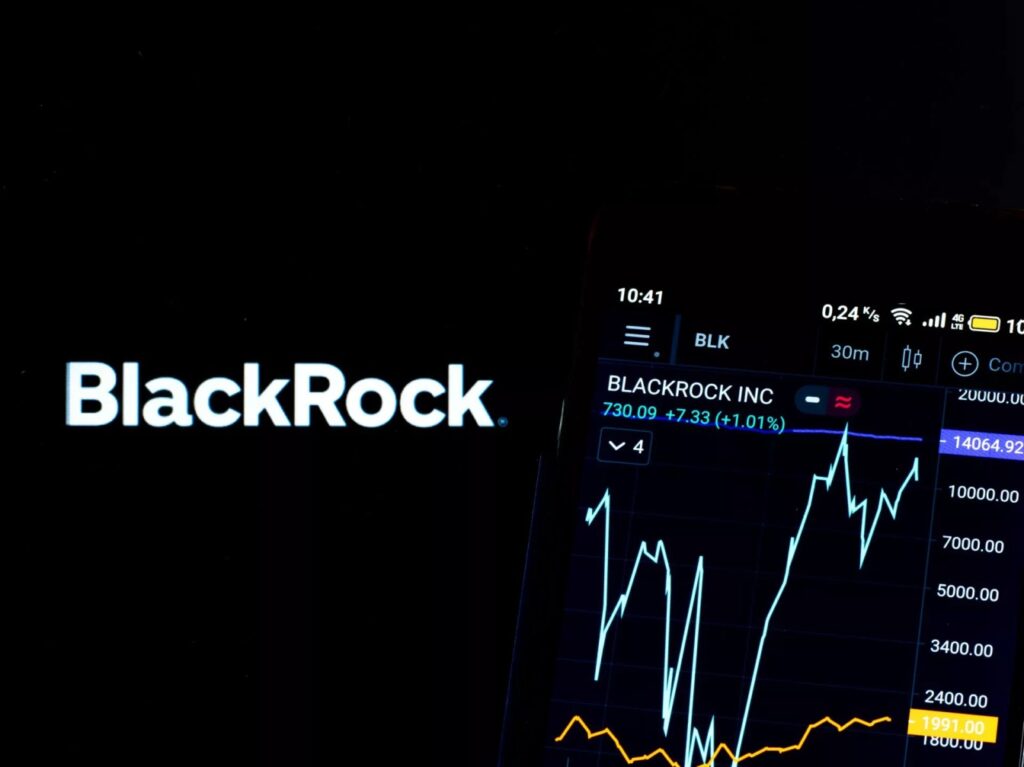BlackRock’s Bitcoin Strategy: A Game-Changer for the Crypto Market
BlackRock’s Bitcoin strategy involves integrating Bitcoin into traditional investment portfolios. This article covers why BlackRock is embracing Bitcoin, their methods for doing so, and the expected effects on both crypto and traditional financial markets, particularly in light of BLACKROCK’S BITCOIN STRATEGY.
Key Takeaways
- BlackRock’s entry into Bitcoin enhances its legitimacy, potentially increasing institutional participation and transforming Bitcoin into a mainstream investment asset.
- The introduction of Bitcoin exchange-traded products (ETPs) by BlackRock provides a regulated avenue for investment, bridging the gap between traditional finance and digital assets.
- BlackRock’s strategy highlights the diversification benefits of Bitcoin, which may attract broader institutional adoption and support the growth of the entire cryptocurrency market.
BlackRock’s Entry into Bitcoin

BlackRock’s foray into Bitcoin represents a pivotal shift in the perception of digital assets among institutional investors. Known for its influential stance in global financial markets, BlackRock’s expansion into cryptocurrency is expected to significantly lower barriers, encouraging greater participation from institutional investors. This move is not just a token gesture but a strategic decision that underscores the growing legitimacy of Bitcoin as a mainstream financial instrument.
The introduction of a Bitcoin exchange-traded product by BlackRock is anticipated to elevate Bitcoin’s credibility within traditional finance. Unlike earlier perceptions of Bitcoin as a speculative asset, this ETF provides a regulated and secure way for traditional investors to gain cryptocurrency exposure. This credibility boost is likely to transform Bitcoin from a niche asset to a cornerstone in diversified investment portfolios.
Furthermore, BlackRock’s involvement could lead to increased institutional participation in the cryptocurrency market. Following BlackRock’s lead, an influx of capital from institutions could stabilize the volatile market, fostering maturity and resilience. Such a shift could also prompt other large financial entities to consider similar moves, thereby broadening the scope and acceptance of digital assets.
The Role of Bitcoin ETFs

The introduction of Bitcoin exchange-traded products (ETPs) by BlackRock is a significant milestone in the cryptocurrency market. Filing for a Bitcoin ETF with the U.S. SEC, BlackRock opens a regulated and secure avenue for traditional investors to enter the crypto space. This ETF is particularly noteworthy for its structure, offering lower fees and direct exposure to Bitcoin’s price, unlike futures-based products that can be more complex and costly. Additionally, the rise of bitcoin etps further enhances the options available for investors.
The success of BlackRock’s spot Bitcoin ETF underscores its importance. Rapidly amassing over $10 billion in value, this ETF has caught the attention of both retail and institutional investors. Its popularity signals a pivotal moment for digital asset adoption, as it bridges the gap between traditional finance and the burgeoning world of cryptocurrency.
Moreover, the potential approval of Bitcoin ETFs by BlackRock could set a precedent for similar products for other cryptocurrencies. This expansion would not only diversify investment opportunities but also drive broader institutional adoption of digital assets. Growing investor confidence in regulated crypto products can enhance the market’s legitimacy and stability, benefiting the entire ecosystem.
Institutional Investors and Market Sentiment
BlackRock’s substantial investment in Bitcoin signals a remarkable shift in institutional confidence towards digital assets. As the world’s largest asset manager, BlackRock’s move is seen as an endorsement of Bitcoin’s viability as a mainstream financial instrument. This endorsement has the potential to transform market sentiment, encouraging other institutional investors to diversify into cryptocurrencies.
The legitimacy that BlackRock brings to Bitcoin cannot be overstated. Historically, Bitcoin has been viewed with skepticism by traditional investors due to its high volatility and perceived lack of regulation. However, BlackRock’s involvement helps shift this perception, legitimizing Bitcoin and opening the door for broader acceptance among traditional investors. This could lead to a wave of new investments across various digital assets, further stabilizing the market and increasing overall liquidity.
Market sentiment towards Bitcoin is heavily influenced by institutional actions and regulatory developments. BlackRock’s focus on Bitcoin may encourage other institutions to follow suit, potentially increasing market stability and reducing price fluctuations over time. As the market matures, Bitcoin’s role as a legitimate asset class is likely to solidify, attracting even more traditional investors.
Bitcoin as a Hedge Against Inflation

In an era of rising inflation and monetary instability, Bitcoin’s fixed supply makes it an attractive hedge against fiat currency devaluation. Unlike fiat currencies, which can be printed in unlimited quantities, Bitcoin has a capped supply of 21 million coins, ensuring its scarcity and inherent value preservation. BlackRock’s focus on Bitcoin as a safeguard against inflation is driven by these unique characteristics.
The growing perception of Bitcoin as an alternative reserve asset is increasingly appealing to investors concerned about inflationary trends. Historical performance shows that Bitcoin has experienced significant price drops followed by substantial recoveries, emphasizing the importance of patience and strategic allocation in investment. BlackRock highlights that small allocations and consistent rebalancing can help manage the risks associated with Bitcoin investments.
Rising government debt levels and concerns about fiat currency devaluation further enhance Bitcoin’s appeal. With growing U.S. federal deficits, Bitcoin’s role as a safeguard against currency devaluation becomes more prominent. This increasing acceptance solidifies Bitcoin’s position in investment strategies, providing a counterbalance to traditional investments during economic instability.
Navigating Market Volatility
Bitcoin’s fixed supply makes it immune to inflationary pressures, but its price volatility remains a significant consideration for investors. Market sentiment, regulatory developments, and macroeconomic factors heavily influence Bitcoin’s price. Despite this, BlackRock is preparing for potential scenarios, such as a $35 trillion dollar crisis, which could make Bitcoin more attractive due to the devaluation of the dollar.
During financial crises, Bitcoin’s appeal as a store of value increases. If the dollar weakens significantly, investors may flock to Bitcoin as a hedge against fiat instability. However, if BlackRock’s prediction of a dollar crisis is delayed, Bitcoin’s price might remain volatile. Understanding these dynamics is crucial for investors looking to navigate the market effectively.
BlackRock’s strategy involves managing volatility through informed decision-making and strategic allocations. Anticipating market shifts and regulatory changes allows investors to better secure their portfolios against unexpected fluctuations. This approach highlights the importance of staying informed and adaptable in the ever-evolving landscape of digital assets.
Diversification Benefits of Bitcoin

Bitcoin offers significant diversification benefits due to its low correlation with traditional financial assets. This unique characteristic can enhance portfolio diversification, providing a buffer against systemic risks that affect traditional assets. When allocated in smaller proportions, Bitcoin’s impact on overall portfolio volatility is relatively modest, making it an innovative tool for diversification.
Compared to traditional investments, Bitcoin’s decentralized nature offers resistance against systemic risks. This resistance is particularly valuable in times of economic instability, where traditional assets might be more vulnerable. Incorporating Bitcoin into investment portfolios helps investors achieve a more balanced asset allocation, mitigating risks and enhancing overall portfolio performance.
The inclusion of digital assets like Bitcoin is increasingly seen as a strategic move in modern investment portfolios, particularly across various asset classes. As other cryptocurrencies gain traction, the diversification benefits extend beyond Bitcoin, offering a broader range of opportunities for investors looking to optimize their returns.
Broader Implications for Other Cryptocurrencies
BlackRock’s leadership in the cryptocurrency space indicates a significant shift towards mainstream adoption of digital assets. As Bitcoin gains popularity, the demand for other cryptocurrencies, or altcoins, is likely to increase. Investors seeking to diversify their portfolios further will explore alternative digital assets, driving broader institutional adoption of cryptocurrencies.
Economic uncertainties and potential crises in traditional currencies, such as the U.S. dollar, could accelerate this shift. As more investors look to hedge against economic instability, the appeal of a diversified crypto portfolio becomes more apparent. This broadening of investment horizons could lead to substantial growth in the market value of various cryptocurrencies, not just Bitcoin.
The growing adoption of Bitcoin sets a precedent for the entire crypto market. As institutional confidence in digital assets strengthens, other cryptocurrencies stand to benefit from the increased legitimacy and market stability. This trend highlights the interconnected nature of the crypto ecosystem, where the success of one major player can uplift the entire market.
Challenges and Risk Factors
Investing in Bitcoin comes with its own set of challenges and risk factors. Bitcoin’s distinct nature means it does not easily fit into traditional measures of risk, making it a unique asset class with its own considerations. Market volatility and regulatory hurdles are significant risks associated with Bitcoin investments, requiring thorough research and risk management strategies.
Regulatory challenges are particularly noteworthy. As governments and financial authorities develop frameworks for cryptocurrency, regulatory changes can impact Bitcoin’s status and market dynamics. BlackRock acknowledges these challenges but sees the potential for Bitcoin’s status to strengthen as market infrastructure improves and regulatory clarity increases.
Investors must be aware of these risks and prepare for various scenarios. Thorough analysis, understanding the regulatory landscape, and staying informed about market developments are crucial for navigating the complexities of Bitcoin investments. Despite the challenges, the potential rewards of investing in Bitcoin make it a compelling option for those willing to navigate its unique risk profile.
Conclusion: Strategic Positioning in the Crypto Market
BlackRock’s entry into the cryptocurrency market signifies a major shift in institutional investment strategies. The integration of Bitcoin into traditional investment portfolios is supported by the introduction of sophisticated financial products, enhancing accessibility for a broader range of investors. This strategic positioning aims to attract more investors to Bitcoin, potentially increasing market liquidity and stability.
The broader economic implications of this shift include a possible reallocation of assets towards digital currencies, influencing overall market dynamics. The embrace of Bitcoin by more institutional investors could ripple through the market, leading to a more mature and resilient cryptocurrency ecosystem.
BlackRock’s Bitcoin strategy highlights the evolving landscape of global finance. Embracing digital assets, institutions like BlackRock pave the way for a new era of financial innovation and investment opportunities. This transformation underscores the importance of staying informed and adaptable in the rapidly changing world of cryptocurrency.
Summary
BlackRock’s strategic entry into Bitcoin is a game-changer for the cryptocurrency market. By legitimizing Bitcoin through regulated financial products, attracting institutional investors, and highlighting its diversification benefits, BlackRock is setting the stage for broader digital asset adoption. Despite the challenges and risks, the potential rewards make Bitcoin an increasingly attractive investment. As the market evolves, staying informed and adaptable is key to navigating the exciting future of cryptocurrency.
Frequently Asked Questions
How does BlackRock’s entry into Bitcoin impact the cryptocurrency market?
BlackRock’s entry into Bitcoin enhances the cryptocurrency’s credibility and fosters greater institutional investment, leading to increased acceptance of digital assets. This shift is likely to have a positive impact on the overall market dynamics.
What is the role of Bitcoin ETFs in the market?
Bitcoin ETFs play a crucial role in the market by offering traditional investors a regulated and secure avenue to invest in Bitcoin, effectively connecting traditional finance with the cryptocurrency world.
Why is Bitcoin considered a hedge against inflation?
Bitcoin is considered a hedge against inflation due to its fixed supply, which creates scarcity and helps preserve value, unlike fiat currencies that can be printed without limit. This quality makes Bitcoin a potential safe haven in inflationary environments.
What are the challenges and risks associated with investing in Bitcoin?
Investing in Bitcoin poses challenges such as significant market volatility and potential regulatory hurdles. It’s crucial for investors to conduct thorough research to navigate these risks effectively.
How does Bitcoin enhance portfolio diversification?
Investing in Bitcoin enhances portfolio diversification by offering a low correlation with traditional financial assets, which helps reduce overall portfolio volatility and mitigates systemic risks.

